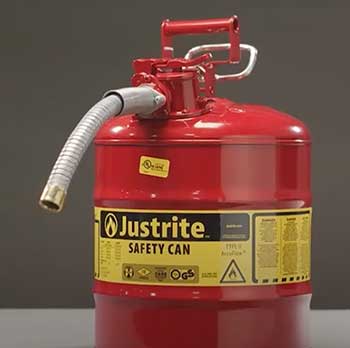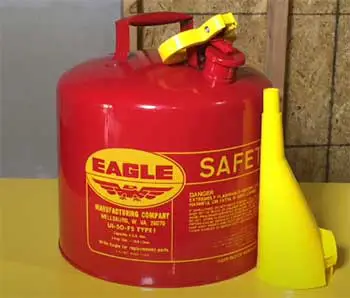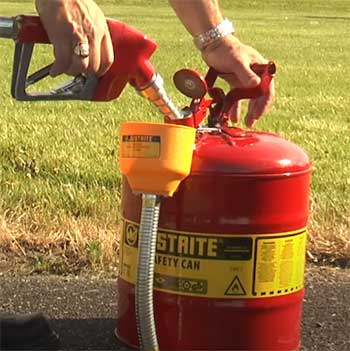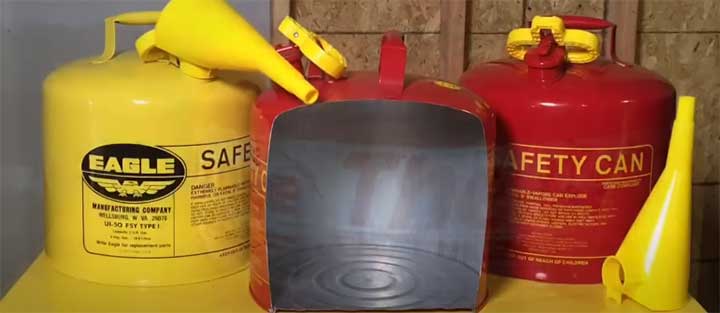Transporting and handling flammable liquids like gasoline, diesel, kerosene or solvents requires using an approved container that meets strict safety guidelines. With over 100 years of experience each, Justrite and Eagle represent two of the top manufacturers of safety cans and containers made specifically for fuels and other hazardous materials.
But with two premium options to choose from, how do you decide whether Justrite or Eagle gas cans are right for you?
By comparing the critical factors around durability, safety, ease of use and cost, you can determine which brand better fits your needs.
A Brief Comparison Table
| Feature | Justrite | Eagle |
| Durability | Best-in-class; galvanized steel resists dents and corrosion for 20-30 years | Very good; painted steel offers slightly less long-term corrosion resistance |
| Ease of Handling | Excellent; ergonomic handles and pouring spouts make for easy control | Very good; some challenges with larger sizes |
| Safety Features | Proprietary innovations like AccuFlow, Gotcha strap and fire guarantee | Meets regulatory minimums but few extras |
| Cost | $65-$150+ per can; premium but warrants long lifespans | $25-$60+ per can; great budget alternative |
| Product Variety | Huge selection of sizes, compliance levels and specialty cans | Solid range but can’t match Justrite’s extensive options |
| Certifications | Meets FM Global, OSHA, UN, NFPA, USCG; unmatched approvals | FM Global, OSHA and CARB certified |
| Maintenance | Galvanized steel simplifies cleaning; parts readily available | Extra effort to clean painted steel but still serviceable |
Brief Backgrounds on Justrite and Eagle
Before diving into the details, let’s briefly cover the histories behind each safety can manufacturer.

Justrite – Founded in 1906, Justrite was one of the pioneers in safety cans and compliant containment products.
They were one of the first companies to adopt FM Global and OSHA guidelines for leak-proof, fire-safe hazardous liquid handling.
Justrite also played a leading role in bringing the safety standards published as NFPA Code 30 to market.
Eagle – Though not as old as Justrite, Eagle has over a hundred years under its belt as well.
The company started by producing steel pails before moving into specialty cans and containers including gas cans.
Eagle uses extensive testing facilities to ensure its products meet the latest compliance codes and chemical compatibility needs.
Both manufacturers have proven track records of quality and safety. But there are some important performance differences that set Justrite and Eagle gas cans apart…
Comparison of Durability and Life Expectancy
Long-term durability is a critical need for any container subjected to harsh shop or job site conditions. Small dents or leaks from wear and tear over time can greatly increase safety risks when handling something as potentially volatile as gasoline.
That’s why construction materials and overall ruggedness should be top considerations when assessing Justrite vs Eagle gas cans.
- Justrite Durability
Justrite is renowned for making some of the toughest, most durable steel gas cans available. Their signature Type I and Type II safety cans utilize high-quality 24 gauge galvanized steel in the tank construction along with sturdy welded seams.
The galvanized coating provides excellent long-term corrosion resistance compared to paint. Rust is much less likely to form, even with exposure to outdoor elements. The thick steel construction resists dents or punctures, while leak-proof welds prevent splitting at critical failure points.
As a testament to their ruggedness, many Justrite owners report getting 20-30 years of reliable use from their safety cans with proper care and maintenance.
Between the dent-proof body and rust-resistant coating, Justrite gas cans will withstand whatever your demanding shop or contracting work sites throw at them. That exceptional durability does come at a cost.
But if you amortize the price over their full lifetime, Justrite cans still represent good value considering their extreme reliability.
- Eagle Durability

Eagle gas cans also utilize a rugged 24 gauge steel construction for good dent resistance just like Justrite.
However, because Eagle relies on a coated paint finish instead of galvanized plating, they fall slightly short of Justrite cans in terms of long-term durability and corrosion protection.
Without the rust-proofing properties of a zinc galvanized coating, Eagle safety cans may start showing signs of wear, fading, corrosion and minor tank leaks sooner than a comparable Justrite can used in the same conditions over an extended timeframe.
That’s not to say Eagle makes poorly constructed products…not at all! But their painted steel finish does mean a shortened service life from eventual corrosion, maybe in the 10-15 year range or so for reasonable use cases. Just not quite as extreme as what Justrite offers.
The Durability Winner – Justrite safety cans win out with best-in-class durability and lifespan thanks to their galvanized construction. But Eagle still makes reputable, compliance-rated gas cans using quality manufacturing.
Ease of Handling and Pouring Comparison
Another key gas can performance metric is how easy the container handles and pours, especially larger 5 gallon sizes. A poorly designed nozzle or awkward tank shape that throws off the weight balance can really hamper your workflow efficiency.
- Justrite Handling
All Justrite safety cans incorporate thoughtful ergonomics and innovations to make them more user-friendly, even when filled to capacity.
Secure-Grip carry handles on either side of certain models provide comfort and control compared to single top handles. The iconic “V-lip” pouring nozzle included on most Justrite gas cans offers precise, glug-free directing.
An optional AccuFlowTM manifold provides even smoother liquid flow with almost no splashing by balancing air pressure within the container.
Many Justrite Type I and Type II cans utilize a triangular tank shape that centers mass for easier lifting, carrying and tipping during pours. The latest design iterations continue improving small details like grip placement/comfort and funnel angles to enhance real-world usability.
Combine those advantages with rugged leak-proof welds and seals, and you get an exceptionally user-friendly safety can design.
- Eagle Handling
Eagle gas cans aren’t devoid of nice touches either. Most feature molded carry handles along with flexible or articulating spouts for clean, controllable pouring.
But in comparing notes between actual owners of the two brands, Justrite seems to come out ahead in most real-world assessments of comfort and control – especially for larger 5 gallon units.
Some report the single top handles on certain Eagle models lead to uneven weight distribution when filled, making them trickier to carry and tip. Others point out issues with Eagle funnel attachments not always directing streams effectively.
So while Eagle offers respectable design, Justrite sets the bar higher for balancing convenience and durable construction to maximize safety and user-friendliness over years of service.
The Handling Winner – Justrite gas cans win again here by better optimizing function alongside form for easiest real-world handling with larger heavy loads.
Integrated Safety Features
You would hope any gas can complies with minimum flash arrestors, automatic vents and other protections mandated by OSHA and NFPA flammable liquid codes.
But beyond just meeting the regulatory baseline, there are a few standout safety features engineered into Justrite cans not found on most Eagle models.
- Justrite Safety Features

The AccuFlowTM Manifold – Mentioned previously under the “Handling” section, this optional upgrade available on Select Justrite steel gas cans provides smoother, more controlled pouring through pressure equalization.
This helps prevent glugs or bubbles which can lead to splashes, spillage or vapor releases.
Gotcha Strap – The urethane nozzle restraining strap stops spills or leaks by securing the pouring spout when not in use.
Prevents puddles from tipped cans. Also helps remind users to check position before lifting.
10K Load and Burn Guarantee – Justrite offers assurance that their cans won’t rupture, leak or allow vapor ignition in a contained fire, provided they’re used and stored properly per guidelines. No guarantee completely negates misuse risks. But this policy provides further confidence in Justrite’s strict safety standards.
- Eagle Safety Features
Eagle undoubtedly meets all the expected protections like child-proof caps, automatic vents, etc. mandated for legal certification. But their cans generally don’t include proprietary safety innovations on par with Justrite’s more advanced AccuFlow and rapid fire mitigation capabilities.
One area where Eagle does excel is providing thorough user information covering proper use guidelines, compliance requirements, and chemical compatibility considerations with an extensive Safety Library on their website.
So they deserve full credit for comprehensive safety communications even if their cans themselves offer fewer integrated features.
The Safety Winner – Justrite pulls ahead again, thanks to enhanced integrated protections like the AccuFlow manifold that increase functional safety margins beyond baseline regulatory minimums.
Authorized Certifications
Both Justrite and Eagle adhere to FM Global and OSHA requirements for Type I and Type II leak-proof, fire-safe portable fuel container construction. So you can feel fully confident using either for gasoline, diesel, oils and other approved flammable liquids handling.
Justrite also complies with US Coast Guard, NFPA, ANSI standards, along with UN/DOT designated packaging guidelines for global transport. On top of that, several Justrite cans meet CARB air quality mandates for California sale.
Eagle meets all the same critical agencies’ criteria like FM Global and OSHA as well. TheirExacta® line also complies with CARB emissions dictates. And Eagle offers IC-rated safety cans specifically for Diesel Exhaust Fluid (DEF) which require special handling.
Ultimately both manufacturers adhere to the core safety and environmental benchmarks for these products. But Justrite does come out ahead in terms of total authorizations met across more local and global compliance gatekeepers.
The Certification Winner – Justrite meets an unparalleled number of certification standards from FM Global to UN and beyond. But Eagle still ticks all the essential boxes like OSHA and CARB approval.
Available Product Variety

With such lengthy histories, both Justrite and Eagle understandably boast extensive product selections today. But there are some assortment differences worth pointing out.
Justrite Product Lineup
Justrite’s catalog includes over a dozen steel gas can options encompassing numerous sizes and specialty use cases:
- 1 Quart up to 5 Gallons – Available capacities span smaller quart (liter) sizes for portability up through larger 2.5 gallon and 5 gallons models better suited for higher volume fuel transport or shop storage.
- Type I vs Type II – Justrite manufactures both standard Type I as well as Type II gas cans with additional leak protections for select models.
- Specialty Cans – You’ll also find cans purpose-built for applications like waste oil collection, kerosene, diesel exhaust fluid (DEF) and even aviation fuels.
- Accessories – Complimentary products sold include mounting brackets, funnel spouts and vapor spout protectors.
With so many well-engineered configurations and custom options, Justrite offers an exceptionally complete safety can assortment tailorable to virtually any application.
Eagle Product Lineup
On the Eagle side, you’ll find a solid range covering typical gas can needs:
- 1 Gallon to 5+ Gallons – Eagle sells comparable capacities to Justrite spanning smaller portable containers up to full 5+ gallon sizes.
- Steel and Plastic – Eagle manufactures coated steel safety cans alongside more affordable rotational-molded polyethylene models if plastic better suits your conditions.
- Specialty Cans – In addition to standard fuel cans, Eagle produces specialized diesel exhaust fluid and water cans with appropriate construction materials.
So while Eagle covers all the expected form factors and specialty variants like DEF and plastic, their catalog just can’t match the expansive options list Justrite provides with over a century more category experience.
The Product Lineup Winner – Justrite wins out here by a wide margin based on their unparalleled variety spanning capacities, compliance levels, materials and fuel-specific designs.
Purchase Cost Comparison
You know what they say about getting what you pay for…and given Justrite’s dominance across the performance metrics above, you’d rightfully assume their cans come at a premium cost. Let’s break down what to expect price-wise when comparing Justrite vs Eagle.
- Justrite Price Point
Being built in America from quality steel and components drives higher manufacturing expenses that do ultimately translate into a real-world price hike for Justrite safety cans.
Although prices vary between resellers, you can typically expect to spend $65 on the low end ranging up to $100+ for new Justrite steel gas cans. And their largest 5 gallon units with extra features hit $150+.
So there’s no doubt you pay extra upfront for Justrite’s extreme durability and smarter designs. But keeping cost in context of their 20-30 year working lifespan validates the investment.
- Eagle Price Point
Alternatively, Eagle gas cans positively shine if upfront affordability is your priority. While manufacturing and importing coated steel cans overseas allows Eagle to reduce production costs, their products maintain respectable quality and performance.
For like-sized gas can equivalents, Eagle models ring up around 40-60% cheaper than Justrite – you’ll pay $25-50 for typical 1-5 gallon units. Their plastic gas cans sell for even less in the teens.
So no question, if saving dollars now is important, Eagle provides huge value. Just don’t expect quite the same long-term endurance at those basement prices.
The Cost Winner – This one goes to Eagle for budget-friendly bargains, albeit with some eventual durability tradeoffs. Justrite commands the performance edge albeit at premium pricing.
Ease of Maintenance
Safety requirements mean gas cans have more complex constructions with internal stabilization plates and sealed assemblies not found on simple open containers. So maintaining leak-free operation does require some diligence.
Thankfully both Justrite and Eagle cans are built to facilitate servicing with replaceable parts and cleaning access. But again, Justrite pulls ahead slightly for easiest upkeep and restoration.
Justrite provides detailed support docs clearly showing teardown and replacement procedures for wear items like gaskets, nozzles and vents. Rebuild kits with new seals and hardware are readily available. And the inherent corrosion resistance of Justrite’s galvanized steel bodies simplifies cleaning after extended exposure.
Eagle offers rebuild components too and enables pinch point inspections per guidelines. But painted steel shows grime quicker with no protective zinc layer. So advantage Justrite for simplified cleaning as the years wear on thanks to their galvanization advantage.
The Maintenance Winner – Justrite’s inherent corrosion protection gives them a small win for easiest long-term maintenance.
Choosing Between Justrite and Eagle Gas Cans
After comparing the two premium safety can manufacturers head-to-head, a few key takeaways should help inform your buying decision:
- Justrite cans are vastly more durable thanks to rugged leak-proof construction and rust-resistant galvanized steel. Expect 20-30 years of reliable performance.
- Eagle offers respectable quality at 40-60% cheaper prices – perfect if affordability outweighs longevity needs.
- Justrite sets the standard for easiest handling and pouring with thoughtful ergonomic designs fine-tuned over a century.
- Both meet FM Global and OSHA portable fuel container safety approvals as the minimum regulatory baseline.
- Justrite provides more size/capacity options plus niche specialty cans for unique cases.
- Eagle simplifies maintenance procedures with detailed support docs and replacement parts availability.
Weigh your specific priorities as a shop owner, fleet manager or contractor needing portable fuel storage against these key tradeoffs between Justrite and Eagle gas cans. Pay more upfront for Justrite’s proven durability you’ll still appreciate decades down the road.
Or save substantially with Eagle if your use cases don’t demand that extreme long-term endurance.
Either way, both manufacturers produce reputable American-designed safety cans purpose-engineered for critical flammable liquid handling. You can rely on both Justrite and Eagle brands to provide compliant, leak-proof gas can and diesel can containment year after year.
Also Read: Why The Price of CO2 Fire Extinguishers So High?
Frequently Asked Questions (FAQ)
For a steel 5 gallon gas can that blends maximum durability, controlled pouring and long-term corrosion resistance, Justrite’s 5 Gallon Safety Can stands out as the best overall for demanding shop or industrial use. Expect it to serve reliably for 20-30 years or more. Eagle’s comparable 5 gallon gas can provides impressive value at half the cost if budget is a higher concern.
The “optimal” gas can depends greatly on your specific portable fuel storage needs and conditions:
1. Justrite steel safety cans represent the gold standard for extreme durability and chemical resistance if longevity is critical.
2. Eagle lower cost steel cans offer a more affordable alternative while still meeting baseline safety approvals.
3. Protective yet budget-friendly Eagle plastic gas cans better suit occasional use rather than daily shop duty.
Prioritize what material properties and performance capabilities matter most before deciding on plastic vs steel cans.
While still engineered in the USA, today most Eagle gas cans are manufactured overseas in China through Eagle’s parent company Scepter. This allows them to produce caps andcoated steel can bodies cost-effectively. But Eagle still handles diligent quality control stateside before products ship.
Absolutely not! Never assume generic plastic utility jugs or water containers also rate as OSHA/NFPA-approved safety cans for gasoline and other hazardous liquids. Only trusted brands like Justrite, Eagle and a few select others undergo required independent lab testing to satisfy official transport and storage regulations. Don’t risk the safety compromises counterfeit lookalikes bring just to save a few dollars. Invest in a certified container like Justrite or Eagle designed to provide long lasting protection against leaks, ignition dangers and other fuel handling risks.
The Bottom Line
For professional-grade safety with maximum durability, Justrite steel gas cans lead the way. Eagle provides comparable protection and quality at a more affordable price point. And plastic cans sacrifice ruggedness for convenience.
Determine which features matter most for your intended gas can uses, and choose the manufacturer that best fits your needs. Both Justrite and Eagle make great options – Justrite if you’re willing to pay more for proven longevity and safety, or Eagle to save money upfront.

